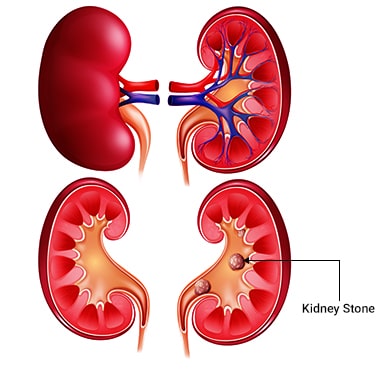Kidney stones are identified to be hard deposits of minerals and acid salts that are formed within the urinary tract. These stones can block the drainage of urine and lead to extreme pain, nausea and, in some cases, vomiting. Kidney stones are not common among children, but cases are on rise these days, due to unhealthy lifestyle and obesity in kids.
If not diagnosed or treated on time, this stone can cause severe damage to the kidney and other organs of the body. If your child is dealing with kidney stones and you are worried about the kidney stone surgery in Delhi, you can let go of all of your doubts by consulting Dr. Niren Rao at Delhi Urology Hospital. Also, to come up with this blog, we have taken his insights related to kidney stones in kids.
What are the symptoms that your kids have kidney stones?
Kidney stones affect children in various ways. Symptoms can vary from those that cause no pain (stones that are in the kidney and have not moved to the ureter) to those stones that cause complications in your urinary system leading to pain. Common symptoms of kidney stones may include:
- Blood in the urine
- Frequent urination
- Pain in the abdomen, side, back or groin
- Nausea or vomiting
- Cloudy or foul smell of urine
- Fever and chills.
If your child is going through pain and you notice blood in the urine, make sure you take immediate action and consult with a best urologist in Delhi right away.
What are the Types of Kidney Stones that affect kids?
Kidney stones usually form when large amounts of substances and too much salt build up in your kidneys and become stones or crystals. Duet and nutrition problems also contribute to many stones, and high sodium intake in the form of salt might be a factor in developing stones in children. A test will be performed to check your child’s uric acid levels to find out the trouble.
Some of the most common types of stones in your kid can include:
- Calcium stones are developed from too much salt
- Uric acid stones can occur with gout after chemotherapy
- Urinary tract infections cause struvite stones
- Cystine stones form in people having cystinuria (an inherited disorder marked by an increased formation of stones in the kidney, bladder, and ureter.)
What causes kidney stones in kids or children?
- Kidney stones are seen when too much mineral (such as salt) is found in the child’s body with water deficiency
- These stones can also be the result of a genetic condition. If you have a family history of kidney stones, there are chances that your child will also get it
- Children who don’t or can’t move for long periods due to surgery or other complications are more likely to experience kidney stones. The reason behind it can be due to the child’s bone inactivity.
Risk Factors For Children That are Diagnosed With Kidney Stones
The underlying causes of kidney stones in children can be:
- Metabolic disorders
- Dehydration ( loss of fluids)
- Less amount of urinary citrate chemical ( a chemical that helps to prevent kidney stones)
- Family history of stones
Methods To Diagnose Kidney Stones In Children
Your doctor may perform a variety of tests to determine the existence of kidney stones, and they are:
- Urinalysis
- Kidney ultrasound
- Abdominal X-ray
- Abdominal/ Kidney MRI
- Abdominal CT Scan
Kidney Stones Treatment Methods For Children
Usually, kidney stones pass through the body’s urinary tract on their own without causing any trouble. Pain relievers can also be used to manage the pain. However, if the kidney stones are causing urinary tract infections, the doctor may prescribe antibiotics as per the kid’s health condition. In some cases, when the kidney stone is large, surgery may be needed to remove it.
- PCNL Surgery: Percutaneous Nephrolithotomy (PCNL) surgery is minimally invasive and used for stones in the kidney that are more than 2 cm in size. However, with the latest technological developments, they can also reduce the stone to as small as 1 cm.
- RIRS Surgery: Retrograde Intrarenal (RIRS) surgery is helpful in patients with small stones in the kidney (15-20mm) or tiny stones in both kidneys.
What Is The Kidney Stone Surgery Cost in Delhi?
Depending on the patient’s health condition and the treatment method, the kidney stone surgery cost in Delhi can range between Rs. 35k and Rs. 60k at Delhi Urology Hospital.
Final Words
Though kidney stones are frustrating and painful to deal with, there are several medical treatments available to overcome them. They must not be neglected as it causes severe complications.
If your child is suffering from a kidney stone, consult Dr. Niren Rao, the top urologist at Delhi Urology Hospital.
With over 20 years of experience, he has treated thousands of patients and helped them live better.

Comments
Post a Comment